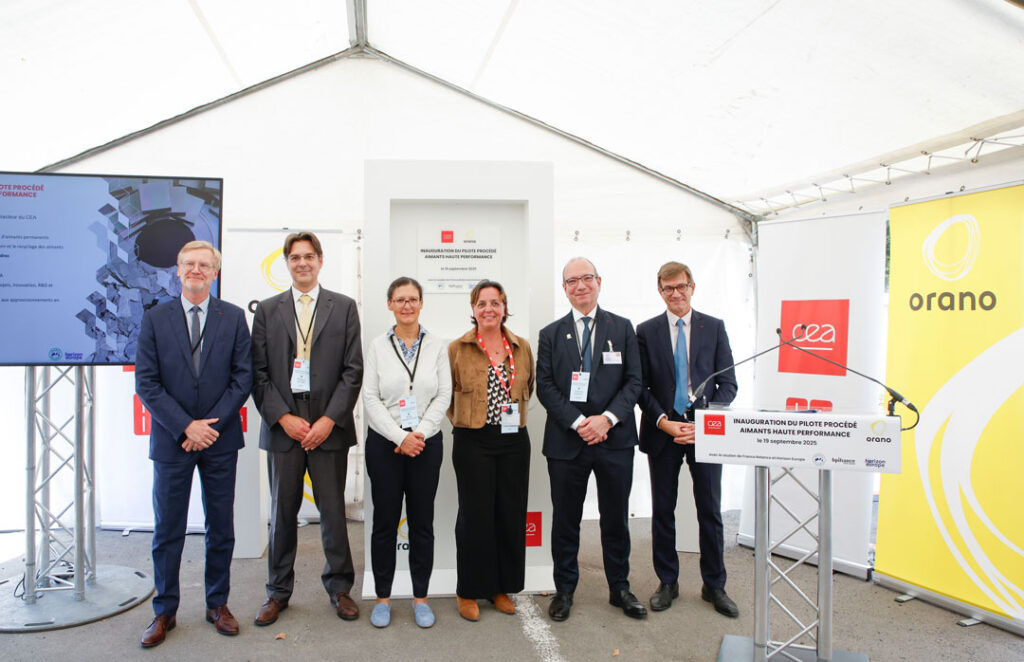France has launched Europe’s first pilot line to recycle rare earth magnets and increase innovation in sustainability, supply security and clean energy.
The Grenobre, France, Orano Group, France’s Alternative Energy and Atomic Energy Commission (CEA) has launched the first European pilot line specialized in the recycling and manufacturing of high-performance permanent magnets made from rare earths.
The ceremony was attended by key figures including French interministeria representatives for strategic minerals and metals, Guillaume Duraud of Orano, and Philippe Store of CEA Energy Division.
Commenting on the landmark facilities, Stohr said: “The establishment of this pilot line, specializing in the circular economy of high-performance magnets containing rare earths, carbon-free mobility, and strategic materials for renewable energy, is perfectly in line with CEA’s innovation mission in repetition and sovereignty in France and Europe.
“With support from French relations and European funding, our team has been able to develop important skills and expertise along with Orano teams. Today we mark a new milestone with industrial-scale equipment.
“We are delighted to share this ambition with our long-time partner, Orano, supported by high-performance magnets in our decades of research at CEA.”
Why are rare earth magnets important?
Permanent magnets containing rare earth elements are important for global energy transitions. It drives electric vehicle motors, drives wind turbine generators, and supports a wide range of clean energy technologies.
However, the production of these magnets is heavily concentrated outside of Europe, creating supply risks for industries that rely on them.
By moving forward with magnet recycling in France, the initiative will strengthen both environmental protection and European autonomy over strategic material.
Short loop recycling breakthrough
Since 2022, research teams from Orano and CEA Liten have worked together to design cutting-edge pilot lines that can meet the most stringent performance standards.
Their work focuses on a pioneering “short loop” recycling process that extracts rare earths from terminal magnets into metal forms and reintegrates them into new, high-performance magnets.
This innovation reduces pressure on natural resources while ensuring that the recycled magnets are tailored to the quality and performance of newly mined materials.
Industrial and environmental impact
The pilot line serves as a testbed for innovative processes, providing manufacturers with a verified way to expand production across Europe. The full program results are expected by the end of 2026 and will set a stage for a large-scale deployment.
Supported by the French Relance Recovery Program and the EU’s Horizon Europe Program, the project is part of two major consortiums focusing on magnet production from critical recycled metals.
Dueau added: “The Magnets and Rare Earth Project is consistent with Orano’s strategy to diversify its activities. Based on the objectives and expertise of the nuclear fuel cycle, we are proud to contribute to effective management of critical metal supply chains and strategic autonomy in Europe, and to maintain natural resources through recycling.
“This project addresses the need for high-performance magnets, essential for the energy transition. We commend the commitment of CEA and the Orano team for overcoming many technical challenges to reach this important milestone.”
Building a sustainable future
By combining cutting-edge science with principles of circular economy, the pilot line represents the critical step in ensuring the supply of rare earth magnets in Europe.
It is not just a technological breakthrough, but it shows a strategic move to protect the environment, reduce reliance on imports, and accelerate the continent’s clean energy transition.
Source link

